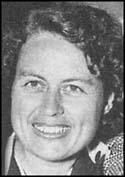Mildred Rackley

Mildred Rackley was born in New Mexico in 1906. After graduating from the University of Texas in 1930 she travelled to Europe to study painting. She settled for a time in Germany but when Adolf Hitler took power she moved to the Spanish island of Mallorca.
In 1935 Rackley returned to America where she joined the American Communist Party. In 1936 she was recruited by the American Medical Bureau and later that year she travelled to Spain as assistant to Dr. Edward Barsky. In January 1937 Barsky and Rackley organized the first American hospital for the volunteers fighting in the Spanish Civil War.
On her return to the United States she became editor of Flight, the magazine of the League Against War and Fascism. During the Second World War Rackley worked in a Californian shipyard where she was an active union organiser.
Mildred Rackley died in 1992.
Primary Sources
(1) An account of Mildred Rackley's experiences appeared in Women's Voices from the Spanish Civil War, edited by Jim Fyrth and Sally Alexander (1991)
In the English Convalescent Hospital, we tried the most interesting experiment at collectivisation of the patients with the personnel in the work of developing the hospital. A patient chooses a piece of work which he thinks needs being done, consults the administration and gets full co-operation in realizing his work. The patients take care of the swimming pool and bath house and fire the boiler, Kuba repairs every watch, clock and machine in the hospital, Michel organized and catalogued the entire storeroom, Thompson organized the food stores, Wilson and Charlie Youngblood clean the patio and the walks daily, Ruperte Iglesias has classes for the illiterate Spanish patients and girls, Bart organized tremendous 'sings' in all languages, Ludwig Holl organized the material and built five kilometers of telephone line giving the hospital proper communication. The president of the popular front granted us a piece of land and in the spring we will have a real garden. We are raising pigs, chickens and rabbits, and have a small flock of sheep and milk goats.
It was a pleasure to work in the English hospitals because none of us ever allowed ourselves to forget that we were building the hospitals for the patients and not for the personnel, and that we would never allow any sort of personal or professional frictions to arise to disturb the well-being of the hospital. It is not a romantic job to have the responsibility for feeding, clothing and evacuating hundreds of patients with varying degrees of serious wounds, and I was able to carry on only through the wonderful cooperation I have always had in the English hospitals.

